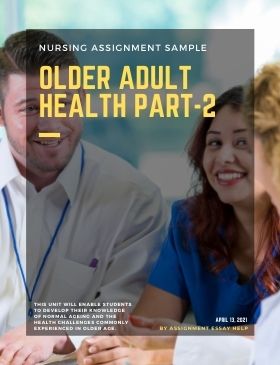
You can download the sample Nursing case study of Nursing Case Study with the following question for free at the end of this page. For further assistance with Nursing Assignment help, please check our offerings in Nursing assignment solutions. Our subject-matter experts provide online assignment help to Nursing students from across the world and deliver plagiarism free solution with a free Turnitin report with every solution.
(AssignmentEssayHelp does not recommend anyone to use this sample as their own work.)
Nursing Question
Unit Outline
This unit will enable students to develop their knowledge of normal ageing and the health challenges commonly experienced in older age. An emphasis on promoting health and wellness even in the presence of chronic illness will be prominent in this unit. Global ageing, legal and ethical care and a palliative approach will also be considered in relation to the older adult. Care provided across a variety of settings including hospital, home and residential will also be explored.
Learning Outcomes
On completion of this unit students should be able to:
- examine the issue of global ageing and the impact of the ageing population in the local context;
- explain the impact of the ageing, multicultural population on healthcare resources;
- promote wellness and quality of life in old age by integrating an understanding of traditional and complementary nursing interventions;
- explain the value of a palliative approach for aspects of elder care, including end of life care;
- consider plans of care for persons experiencing chronic illness and co morbidities, including alterations to respiratory, cardiac, renal, orthopaedic, diabetes (type II), cognitive and sensory function;
- justify a position on legal and ethical issues that have particular relevance to the nursing care of older adults; and
- recommend appropriate ways of caring for older adults across a variety of settings.
Nursing Solution
Elder Abuse (Personal Experience)
I noted an event related to the abuse of an elderly individual during my placement in a clinical setting. The elderly patient was affected by the pattern of dementia and was not willing to consume food during meals time. However, healthcare staff posted for the care of patients at that point of time forced the elderly patient to consume food despite her unwillingness that resulted in the violent reaction of the patient following the forceful administration of meals. Eventually, the elderly patient was physically and mentally tortured by the caretaking team that deteriorated her physical as well as psychosocial condition. The patient was dragged out of her bed and severely beaten up further, leading to a chaotic situation and adverse psychosocial outcomes.
Risk Assessment
I cared for an elderly demented patient in the healthcare setting who was entirely dependent on caretakers for undertaking the activities of daily living and personal care. Indeed, dementia was considered as the greatest risk factor that considerably elevated the risk of the elderly patient in terms of experiencing episodes of falls and resultant traumatic conditions. Other risk factors that were considered in relation to evaluating the probability of patient’s falling episodes attributed to her vitamin D status, multi-morbidity, polypharmacy and weakness (Pfortmueller, Lindner, &Exadaktylos, 2014). The action plan configured for reducing the risk of a patient’s fall advocated the requirement of accomplishing the nutritional and medication needs of the patient. The healthcare team configured assistive interventions for the treated patient in the context of supporting her for the accomplishment of individualized requirements in the healthcare setting. These assistive techniques included the configuration hassle-free environment, deployment of stairways, wood-steps, grab-bars and bedrails in patient’s room.


 WhatsApp Us
WhatsApp Us